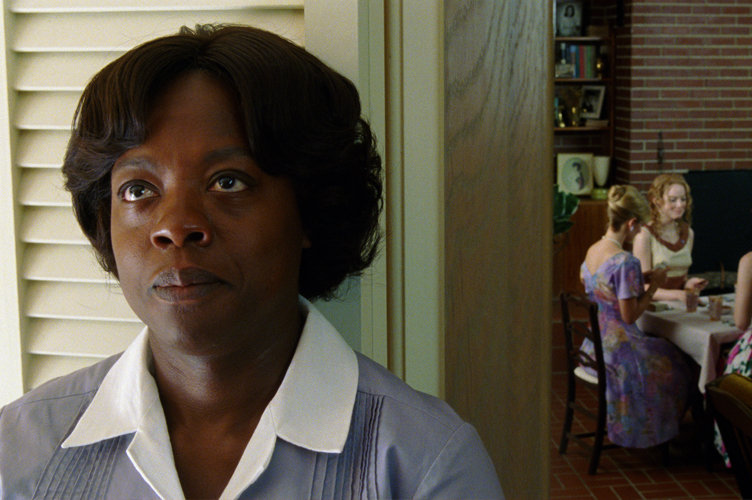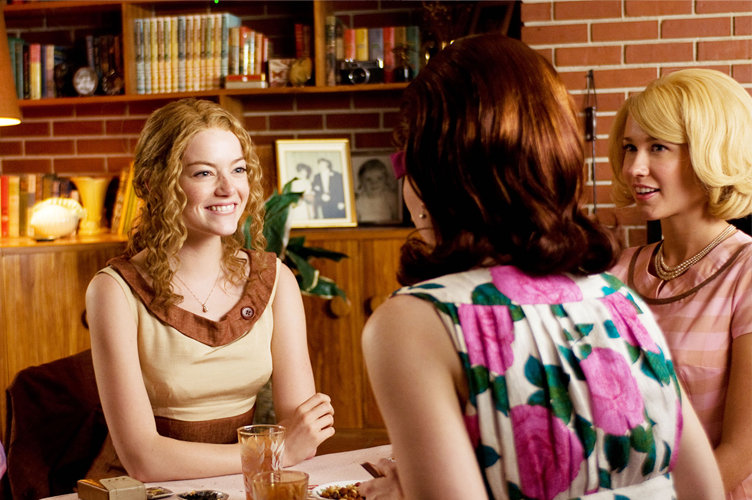|
The Help
Reviewed
by Damien Straker on
August 23nd, 2011
Dreamworks Pictures presents
a film directed by Tate Taylor
Screenplay
by Tate Taylor based on the novel "The Help" by Kathryn Stockett
Starring:
Emma Stone, Viola Davis, Octavia Spencer, Jessica Chastain and Bryce Dallas Howard
Running
Time: 146 minutes
Rating: TBA
Released:
September 1st, 2011
|
8/10
|
|
This
is an
adaptation of Kathryn Stockett’s bestselling novel, set in Jackson,
Mississippi, during the 1960s. The film follows three different women.
The
first is Skeeter (Emma Stone), a young woman hired to write a column
about
housecleaning. She’s also wondering what happened to her maid
Constantine, who
helped raise her, but has now disappeared. The second is Aibileen
(Viola Davis)
and Skeeter asks her for advice with her column. She’s a maid for
Elizabeth (Ahna O’Reilly) a snobby woman who can barely be bothered looking after her
own
children. The third woman is Minny (Octavia Spencer) and she finds work
as a
maid for Celia (Jessica Chastain), who lives out of town. Celia doesn’t
want
her husband to know that she can’t cook or clean so Minny has to help
secretly.
Bring these women together is Skeeter’s plan to write about how African
American maids are treated by their white employers. She’s upset that
one of
her friends Hilly (Bryce Dallas Howard) is looking to enforce a rule
that will
force the ‘help’ to have separate bathrooms from their white employers.
But
Skeeter finds the maids reluctant to share their experiences because of
the
dangerous political climate in Jackson.

Tate
Taylor's
second feature film The Help is an
absorbing period drama, regardless of whether you have read Kathryn
Stockett’s
novel. I have read the novel and the essence of the story is retained.
It’s a
moving story that suggests that change is found in people of all ages,
generations and races. It believes in the power of literature to inform
people
and to change the world. And there are ideas of class and the
importance of public
perception in this time period too. There are no easy divisions in
either the
novel or the film. Not all the white’s are selfish or simply racist.
They’re
willing to alienate their own people too. We see the women’s deliberate
exclusion of Celia and also learn that Hilly put her own mother (Sissy
Spacek)
in a nursing home. But nor are all the African American’s innocent
either. They
make poor choices too. An ongoing thread is that after Minny was fired
she
decided to give Hilly a booby trapped cake, which she later regrets.
And off
camera it’s apparent that Minny is physically abused at home. Though
many
scenes from the novel have been omitted entirely, it’s a very solid
adaptation.
The film is beautiful in recreating the period, but never glossy.
Despite being
nearly two and a half hours long the film doesn’t linger either. It’s
well
paced and the images resonate with us. One of the most memorable is
seeing the
‘help’ walk out of their homes of a morning, dressed in their uniforms.
We see
Minny giving instructions to her daughter who is now part of the
‘help’. That
subtly reminds us that these women weren’t just employed for one
lifetime.

What’s
missing
from the film are the darker elements of the novel. In the novel
there’s a
broader overview of the violent atrocities around Mississippi that’s
absent
here. It is indeed a compromise but more for business reasons rather
than a political
agenda. This is a mainstream film that has already flourished at the US
box
office. If the film was uglier less people might have seen it at all.
But then it
might have been more honest too. It’s a great example of the dilemmas
faced by
the studio system. Instead, the fear and anxiety of the period comes
through
many of the performances. Almost all of the women in this film are
superb. Emma
Stone is extremely lively and funny as the oddball Skeeter. But she
smartly
replaces a lot of her flamboyance and sarcasm from Easy A (2010) with a
greater sense of vulnerability. Some of her expressions when
revelations about
her mother are announced are extremely touching. But Viola Davis is the
one
almost certain to be nominated for Best Actress early next year. She
has the
bravest face in the film and yet underneath her internal conflict is so
visible
and moving. Her performance, particularly when she talks about her son,
is
painfully genuine. Spencer and Howard are charismatic women too. The
latter
contrasts the fake smiles of parties and charity dinners with ice-cold
looks of
suspicion perfectly. The only weak link is, I think, Chastain. I was
expecting
a quieter performance, closer to her excellent work in The
Tree of Life (2011). She’s
extremely colourful here when her character in the novel is physically
deteriorating and spends a lot of time alone in her room. Granted, that
would
be a lot harder to film onscreen. The film might not have the grit of
an
independent picture like Precious (2009)
but several of the performances make The
Help an endearing look at a dark chapter in American history.
|